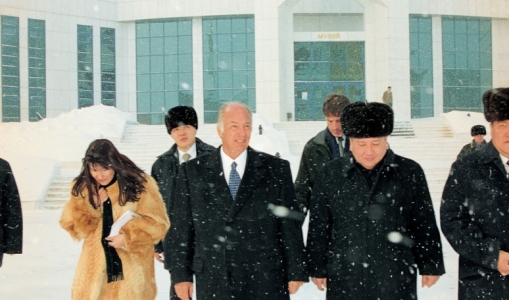Tajiks have more faith in Aga Khan than UN water forum-2003-09-02
Fountains played all around Tajikistan's capital Dushanbe for a UN-sponsored water forum this week, but many in this war-weary Central Asian country drew greater comfort from the visit of Ismaili Muslim leader the Aga Khan.
Having been wracked by civil war in the 1990s, this remote mountain republic of 6.5 million people was determined to show the world a new face at the International Fresh Water Forum, intended to help ease ex-Soviet Central Asias deepening crisis of desertification and disease.
But with salaries averaging around 10 dollars a month in Tajikistan and water in 45 percent of schools said by a recent United Nations survey to be unsafe, residents were not optimistic about this keynote event in the UN's "year of fresh water."
At a run-down Dushanbe housing complex they blamed widespread health problems such as typhoid, diarrhoea and diphtheria on a barely functioning water distribution system which leaves hundreds of families reliant on a single mud-spattered standpipe in the street for much of the time.
"Will the forum make our water clean?" Ramzija, a local resident, demanded. And she answered her own question: "No. Our government doesn't think about how people live."
With security men everywhere, and amid some criticism that those affected by water problems were under-represented, it was the attendance of the Aga Khan which sparked real feeling among thousands who have settled in Dushanbe seeking relief from hunger, disease and instability elsewhere.
Crowds gathered hours in advance to greet the leader of the world's Shiite Ismaili sect, saying that his Aga Khan Development Network had saved their lives by relief work during and after the 1992-97 civil war which claimed some 50,000 lives and created hundreds of thousands of refugees.
Some 200,000 people in Tajikistan profess the Ismaili faith, which has adherants in at least 20 countries but little formal structure.
"If it wasn't for his help we might all have died, he gave us food, medicine, education, everything," said Muslim, an engineer, waiting as the Aga Khan opened a cultural centre. "People feel his concern for us."
But he and his friends were dismissive of the water forum.
"They switch on the fountains for conferences," said Masrur, an English teacher. "But we have no water at home."
Some of these problems were touched on by President Emomali Rakhmonov, who is expected by some observers to cling to office until 2020 under the country's flawed electoral system.
"It's necessary to take urgent measures to supply the city with fresh water and relieve the current water stress," Rakhmonov told delegates.
Country-wide this stress is so great that 43 percent of people have no access to piped water while 16 percent of Dushanbe's piped water is untreated, a new UN report says.
Substandard water resulted in large typhoid outbreaks in Dushanbe in
Inside the conference hall some delegates were also doubtful about the forum's ability to solve either local problems or the wider problem symbolised by the shrinkage of the Aral Sea, which straddles Kazakhstan and Uzbekistan.
Due to mismanagement by the five bitterly divided ex-Soviet Central Asian countries -- Tajikistan, Kyrgyzstan, Kazakhstan, Uzbekistan and Turkmenistan -- the Aral's drying has left a 400,000-square-kilometre wasteland of pesticide-laden salt threatening some three million residents.
When it comes to cooperating on water problems the countries "are at the very beginning stages at best," Margaret Catley-Carlson, chair of the Global Water Partnership think-tank, said.
For Catley-Carlson the Aga Khan's message of involving and educating local people in water management is key and could be lost as media in the region are more government mouthpieces than forums for debate.
"People scattered through mountains are seen as a problem (but) with support and assistance mountain people can be part of the solution," the Aga Khan told delegates, adding:
"Civil society organisations based on responsibility and transparency ... require legitimacy in the eyes of government."
- 5673 reads
 Ismaili.NET - Heritage F.I.E.L.D.
Ismaili.NET - Heritage F.I.E.L.D.